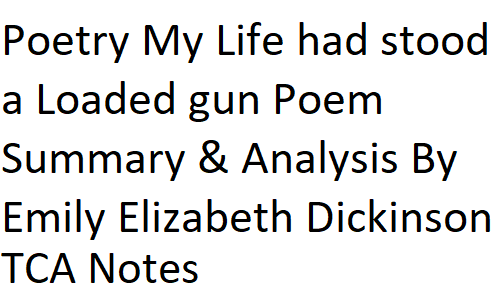Poetry The Slave Auction Poem Summary & Analysis By Frances Ellen Watkins Harper
tcanotes, Summary, Short Stories, Poems, Novel, English Literature, Prose, Drama, Analysis, English Essays, TCA Notes, The Concept Academy Notes
To view related topics Click Here.
Introduction
African American poet and abolitionist France Ellen Watkins Harper is the author of “The Slave Auction” In this poem, an observer describes her feelings as she saw black people being exchanged at an auction.
Harper sheds light on the emotions of individuals who experience great anguish when their loved ones are taken away from them, particularly black women. Their sable appearance, which kept them inferior in the racists’ eyes, was their only flaw. This is vividly portrayed in Harper’s poem.
About the poet
In the nineteenth century, Frances Ellen Watkins Harper was well-known for her work as a speaker, novelist, and poet. She co-founded the National Association of Colored Women’s Clubs and was a prominent abolitionist, suffragist, and reformer in addition to being the first African American woman to publish a short story.
Line 1-4
The sale began young girls were there, Defenseless in their wretchedness, Whose stifled sobs of deep despair Revealed their anguish and distress.
The poem “The Slave Auction” by Frances Harper opens with a description of a slave auction scene. The little girls are described as being “defenseless” and “wretched” in the poem.
By expressing their “stifled sobs” and their “deep sadness,” Harper alludes to their suffering. Slaves who were denied freedom and kept as captives as children frequently saw this situation. Their agony and grief, which were typical of young slaves who were denied freedom, are conveyed in Harper’s poem.
Line 5-8
And mothers stood, with streaming eyes, And saw their dearest children sold; Unheeded rose their bitter cries, While tyrants bartered them for gold
The second stanza of Harper’s poem shows the mothers’ mental state as they sob helplessly as their kids are sold for gold. Harper compares the tears to an endless stream by using the metaphor of “streaming eyes” to depict them. The reason the mothers are sobbing is that their kids are being traded for gold, and Harper uses the metaphor of “tyrants” to describe the slave traders.
Line 9-12
And woman, with her love and truth' For these in sable forms may dwell' Gazed on the husband of her youth, With anguish none may paint or tell.
Harper combines the words “love” and “truth” to convey that black women attended the slave auction to be faithful to their spouses, even if it meant losing them. She often refers to their spouses as “sable forms,” which is French for “black.”
They attempted to recall how powerful they had been in their youth as they gazed at their spouses, but they were unable to resist the oppressor’s assault and gave in. Neither poet nor painter could capture the awful suffering their wives were going through.
Line 13-16
And men, whose sole crime was their hue, The impress of their Maker's hand, And frail and shrinking children too, Were gathered in that mournful band.
The men at the slave auction are the focus of the fourth verse of Harper’s poem. She explains to the audience that their ability to exercise their freedom was based on the color of their skin and that the color black is a result of God’s hands.
In a further ironic statement, Harper claims that their dark color is a result of God’s hands and that they are not to blame for what is happening to them. As if it were a funeral or someone was losing a loved one forever, Harper also refers to the group as a “mournful band” while describing the crowd.
Line 17-20
Ye who have laid your loved to rest, And wept above their lifeless clay, Know not the anguish of that breast, Whose loved are rudely torn away.
According to Harper’s speaker, those who have lost loved ones cannot possibly comprehend a black mother’s suffering. The slavers cruelly tore their loved ones away, and only a mother whose weaning child is snatched from her can appreciate this sorrow, she says, using the synecdoche to refer to black women.
Black women are referred to by synecdoche in Harper’s discourse because the slavers cruelly tore them apart, and only a mother whose growing child is snatched from her can understand this sorrow.
Line 21-24
Ye may not know how desolate Are bosoms rudely forced to part, And how a dull and heavy weight Will press the life-drops from the heart.
The final stanza of “The Slave Auction” restates the idea from the previous one. Their bosom is described by Harper as a “desolate” location, and the slavers are to blame for their suffering. As a metaphor for blood, he compares slavery to a “dull and heavy weight” that will squeeze the “life-drops” from a black woman’s heart. This implies that their hearts were wounded by slavery and caused to bleed.

tcanotes, Summary, Short Stories, Poems, Novel, English Literature, Prose, Drama, Analysis, English Essays, TCA Notes, The Concept Academy Notes




























